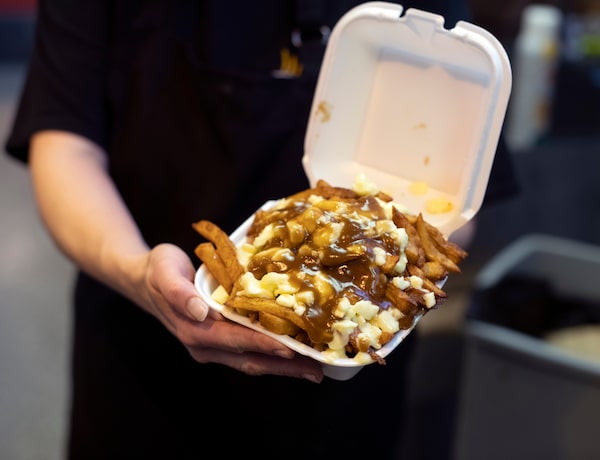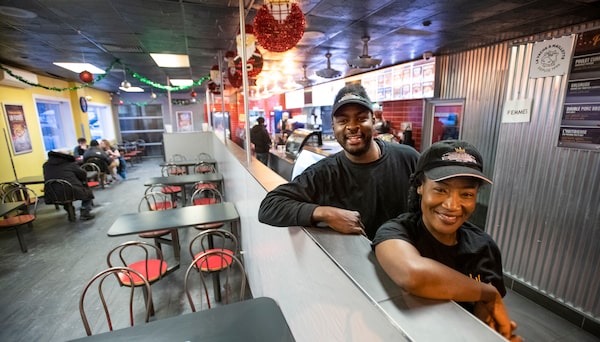
Carlos Sodji and Sylvaine Senou are a married couple who own the Chez Morasse poutinerie in Rouyn-Noranda, Que., where they have lived for seven years. 'At first, as black Africans, we were afraid to take on such a big restaurant in Rouyn,' but things have worked out well, says Mr. Sodji.Fred Lum/The Globe and Mail
In most ways, Chez Morasse is a typical Quebec casse-croûte. It stands across the street from the junior hockey arena in Rouyn-Noranda, a small northern city in a mining district. It serves poutine, steamed hot dogs and Pepsi.
The same family ran the business for three generations, beginning when Conrad Morasse opened a humble chip stand in the 1960s.
But this summer, the restaurant changed hands – to a pair of surprising new owners. Carlos Sodji and Sylviane Senou are from the West African nation of Benin – not part of the traditional poutine heartland, you could say. The cuisine of Benin – “very colourful, lots of vegetables” – has nothing in common with gravy-soaked fries, except maybe for the use of potatoes, Ms. Senou said. Before coming to Quebec, neither she nor her husband had ever heard of cheese curds.

An order of poutine at Chez Morasse.
The couple have lived in Rouyn for seven years now, with their two small children. Mr. Sodji and Ms. Senou grew up speaking French – the official language of Benin – and now use Québécois expressions such as niaiser (goofing around) and the classic Catholic curse words. The whole family are Canadian citizens.
Still, buying Chez Morasse was a step into the unknown. Their skin colour made them visible outsiders, and they were proposing to take over an institution that specializes in a dish closely associated with Quebec identity – so much so that a commentator in the newspaper La Presse recently wondered whether poutine should be officially recognized by UNESCO.
“At first, as black Africans, we were afraid to take on such a big restaurant in Rouyn,” Mr. Sodji said. “We were worried people would take that badly.”
The political rhetoric around newcomers has been hardening in Quebec. During the fall election campaign, for example, then minister of immigration Jean Boulet declared that 80 per cent of immigrants to the province “don’t work, don’t speak French, or don’t adhere to the values of Quebec society.”
Since their arrival, however, Mr. Sodji and Ms. Senou have also seen the society’s more welcoming face.
When Mr. Sodji made the somewhat unlikely trek to Rouyn-Noranda a decade ago, it was to study engineering. At the same time he found odd jobs that included, crucially, delivery driver at Chez Morasse.
On a return trip to Benin in 2014, he met a young woman named Sylviane and convinced her to join him in Canada. She wasn’t sure about Rouyn-Noranda at first – it didn’t have the glittering profile of a metropolis such as Montreal, let alone Paris, where she had once lived. But it soon grew on her. The city might have been cold and remote, but the people were warm, and everyone seemed to know each other.

Ms. Senou shares a laugh with Roger Bertrand, a regular patron of Chez Morasse. She was initially apprehensive about living in Rouyn-Noranda, but she's grown to like the community, and vice versa.
:format(jpeg)/cloudfront-us-east-1.images.arcpublishing.com/tgam/J2AVR3Q2WFB6XGKVJVDWWGOXIU.jpg)
:format(jpeg)/cloudfront-us-east-1.images.arcpublishing.com/tgam/RVN62PPL7ZFGDEXKYDGMDS76EI.jpg)
Rouyn was surprisingly accustomed to folks who looked different and spoke with accents. During the boom years of the 1940s and ’50s, when the local copper mine and smelter employed thousands, workers from Eastern and Southern Europe made the town a cosmopolitan haven in the northern bush. A Serbian baker used to own the bread factory now occupied by Chez Morasse. There’s a synagogue down the street.
The couple’s new home has been home to the Morasse family for more than half a century. Patriarch Conrad introduced the region to poutine in the 1970s, and built his little chip stand into a famous regional destination, before giving way to his son Christian, who was now co-managing the restaurant with his daughter Florence.
They were fixtures in the community, but looking to move on. The pandemic had hurt sales, and Christian was nearing retirement age.
When Mr. Sodji heard about the planned sale, he put himself at the front of the line. He came from a family of wood sellers, alcohol merchants, accountants – he had business in his blood. Ms. Senou’s people were restaurateurs.
Mr. Morasse knew them both, in part because they had been helping with the immigration dossiers of six workers from Benin he hoped to bring over. He liked their energy and eagerness – ”They had a spark in their eye,” he said – and the way they meshed with the community.
“Every time I walk down the street with Carlos, someone opens their window and yells, ‘Hello Carlos!’” Mr. Morasse said. “I told him, ‘You’re going to become mayor of Rouyn.’”

Mr. Sodji and Ms. Senou have been building a rapport with their regulars at Chez Morasse.
The news of their ownership has been received far better than Mr. Sodji feared. Sales are up. Long-time regulars banter with them as if they’re old friends. Benjamin Doré, a 26-year-old waiting for a takeout pizza order, said he thought it was a good thing a couple from Africa had taken over Chez Morasse.
“Rouyn is very multicultural,” he said. “People think because we’re in the regions we’re closed off, but it’s totally false. I think we’re more open than ever.”
The city is indeed experiencing a renewed flourishing of cultural diversity, as young people from the Maghreb, West Africa and France come for work, and Quebec recruits more immigrants from French-speaking countries. There are about 500 local residents from Cameroon alone, Mr. Morasse estimates. An African grocer recently opened up downtown, and the Sodji-Senous plan to launch an African restaurant soon.
As for Chez Morasse, the couple has no intention of changing a winning formula. The fries will still be cooked with lard, not vegetable oil; Pepsi will remain the cola of choice. Adding alcohol sales and offering kebabs are possible longer-term projects. But the truth is, they’ve fallen in love with poutine themselves: Ms. Senou says she could eat it three meals a day.
Such is their love for the fabled dish, they dream one day of opening a Chez Morasse franchise in the place they come from – even if it’s no longer the place they call home.
“Our long-term vision is to bring poutine to Benin,” Mr. Sodji said. “They’d love it!”

Do you think you have what it takes to complete The Globe’s giant holiday crossword?
Download the puzzle here. Share your progress with us on social media using the hashtag #GlobeCrossword.